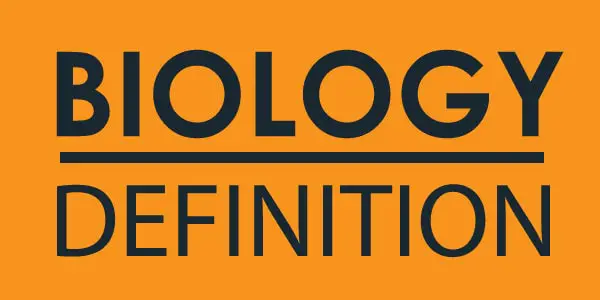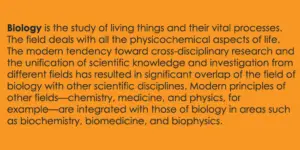
Biology Definition
Biology Definition: it is defined as the science that searches for characteristics that distinguish humans, animals, and plants from non-living things, such as growth, reproduction, nutrition etc. The biology is derived from two Greek words: ‘bios’ means life, and ‘logos’ meaning logic or study.

it is a science that specializes in studying the cellular structures of all life forms; simple ones such as bacteria that make up a cell one.
Characteristics of living things:
Living organisms are distinguished in all their forms with characteristics that distinguish them from inanimate objects. Among these characteristics are
- Regulation: Living organisms are distinguished by having a complex and independent structure, starting with the basic unit from which all life forms, that is, the cell.
- The need for energy: All living things need the energy they obtain in the form of food in order to carry out their metabolism and to survive.
- Growth: All living organisms grow and increase in size, and they can rebuild their cells when exposed to wounds.
- Reproduction: All living things are distinguished by their ability to produce new individuals.
- Response: All living things have the ability to respond to different stimuli.
- Adaptation: It means the ability of an organism to respond to the requirements of the environment in which it lives.
Biology Branches:
Biology is divided into many branches, including
- Botany,
- Biochemistry.
- Cellular Biology.
- Ecology.
- Evolutionary Biology.
- Genetics.
- Molecular Biology.
- Physiology.
- Zoology.
- Biotechnology.
- Bioinformatics.
Biology relationship to other sciences:
Biology is a link between other natural sciences, and here are some examples that explain the relationship of biology to other sciences: [1] Biophysics: The science that uses theories of physics and mathematics to analyze some issues related to biology. [2] Astrobiology: The science that links biology and astronomy, and specializes in the study and development of extracellular life forms. [3] Biogeography: The science that explains the interpretation of the distribution of living things in the places in which they live.
[4] Biomathematics: Science that specializes in the study of topics and aspects of biology, using mathematical techniques and models. [5] Bioengineering: science that uses the principles of engineering to understand and analyze biological systems, and uses the principles of biology to analyze the principles of engineering science and its systems. [6] Sociology: the science that examines the role of biology information social construction of individuals, and their culture, and relations between them.
Basics of biology:
Among the basic concepts related to biology are the following:
- Homeostasis: Balance or internal stability or the ability of an organism to maintain and stable the internal temperature environment,
- Cell Theory: The theory of the cell developed by the scientist Rudolf Virchow in 1855 AD states that the bodies of living things consist of cells, and that living cells originate from previous living cells.
- Gene Theory: It states that genes are transmitted from parents to offspring through the transmission of hereditary material, knowing that genes are part of the chromosomes, and they are formed from the DNA deoxyribonucleic acid (DNA).
- Evolution: The theory of evolution assumes that all living organisms originate from a common ancestor and that the differences that appear between living organisms are caused by genetic mutations, as the scientist Charles Darwin assumed that evolution also occurs through natural selection; that is, the living creatures that are able to adapt to its environment, which remains and inherits its characteristics to its children while living organisms that are unable to adapt to their environment die.
The most important biologists:
| Names of Biologists | Their Contributions in Biology |
| Aristotle | The first to establish zoology, he studied many marine animals and plants. Theophrastus Aristotle’s disciples also have contributed to the development of biology with his texts relating to the composition of plants, their life cycle, and their uses. |
| Leonardo Da Vinci | Da Vinci practiced the autopsy of human bodies secretly, and he left detailed illustrations for those who left behind to dissect the human body. |
| Leonhard Fuchs | A German botanist, author of one of the oldest printed books, a book on botany. |
| Carolus Linnaeus | He is the pioneer of taxonomy who invented the binary naming system, gave living creatures Latin names, and divided living organisms into groups & types depending on their common characteristics. |
| Robert Hooke | The scientist who discovered the cell in 1676 AD while studying a sample of cork using a compound microscope, and declared that plant tissues consist of repeated rectangular units. |
| Anton von Leeuwenhoek | The scientist who published the first drawing of a single-celled organism. |
| Theodore Schwann | Who discovered in 1839 that animal bodies are made up of cells. |
| Charles Darwin | He published in 1859 AD a book (On the Origin of Species), in which it was assumed that all living things originated from a common ancestor and that the diversity of living beings is due to their ability to adapt to their environment. |
| Gregor Mendel | Founded genetics, and published his research on the transmission of genetics in 1866. Watson and Crick: Two scientists designed a model that illustrates the synthesis of deoxyribonucleic acid (DNA). |
Why Do We Need Biology?
Biology takes a vital part in understanding the systems of complex life forms which include humans, animals, and plants. Biology aid scientists to study and understand the logics between the human and the world.